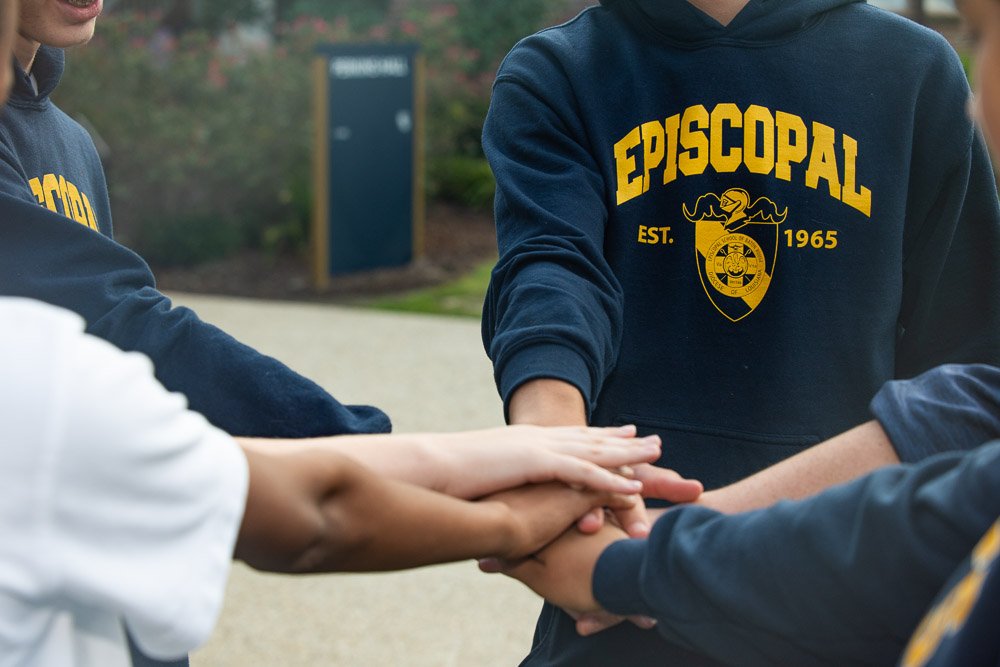- Admission
- Discover Episcopal
- Our Program
- Athletics
- Arts
- Spirituality
- Student Life
- Support Episcopal
- Alumni
- Parent Support
- Knightly News
- Contact Us
- Calendar
- School Store
- Lunch Menu

Mission and Ministry Statement
As a ministry of the Episcopal Diocese of Louisiana, Episcopal School of Baton Rouge nurtures and develops the whole child -- spiritually, intellectually, morally, physically and artistically -- through challenging academic and co-curricular programs that prepare our graduates for college and for purposeful lives.
DEI Statement
Our identity as an Episcopal school is rooted in our mission and our ministry. We are part of the Episcopal Church and the Episcopal Diocese of Louisiana. As an Episcopal school we are a Christian school that seeks out and invites diversity. We welcome people of all faiths, cultures, ethnicities, and backgrounds to come and be part of this community. It is a place where everyone should feel like they belong and are respected. The National Association of Episcopal Schools (NAES) constantly works to help Episcopal schools define and explain Episcopal Identity, helping us all to live into that identity in the midst of a complex and ever changing world.
The following NAES Statement on Diversity, Equity, and Inclusion is at the heart of what it means to be an Episcopal school and how we help all those who come to school here feel like they belong.
A Reaffirmation of Our Core Belief
Episcopal schools ground their commitment to diversity, inclusion, justice and equity in the words of the Baptismal Covenant, and our promise as Christians to “seek and serve Christ in all persons, loving your neighbor as yourself,” and, “to strive for justice and peace among all people, and respect the dignity of every human being.” That pledge to respect the dignity of every human being includes how we differ from one another, as well as how we share a common humanity and reflect the image of God. It serves as a guide to our daily need to act with compassion, love and integrity, as well as to name and challenge behaviors that promote exclusion, intolerance, and mistrust.
As Episcopal schools we also are the beneficiaries of a strong intellectual tradition, characterized by questioning and probing further into the ideals and beliefs that ground us. This means often entering into difficult conversations on matters of how we differ from each other, instead of sidestepping them. Those conversations are characterized by the honoring of others, not the shaming or dismissing of some, and offer us opportunities to learn about ourselves as well as each other. These honorable conversations are needed among the adults in the community, not just students.
Our tradition is one of graciousness, generosity, and humility—we do not possess all of the answers, and we are eager to learn from each other. One of the best vehicles for enhancing that learning is the intentional cultivation of a diverse community, one that is welcomed into the total life of the school. A sense of belonging is essential to a climate of learning, and serves as the optimal mode of preparation for our students’ futures.
Our schools’ awakening to the urgency of the moment is not just an “add on,” but a return to and a renewed appreciation of the sources of our belief and action. What we reiterate here is not something novel, nor does it serve as a cover for any agenda other than the moral and theological expression of our deepest convictions, commitments, and understandings of who we are as a community.
Episcopal schools are places where people from all different types of perspectives and traditions show up and engage in the joyful process of learning. This is not only what we are supposed to do, but what we love to do. In these ways we share with what many fine schools of different traditions do. What makes us unique is the theological foundation we draw from and lead with, the source of all that inspires us to be proud, courageous and welcoming in our inclusive approach to learning. We were created by God to do and be these very things.
A few important definitions:
DIVERSITY - The intentional development of school communities where people of different backgrounds and points of view come together as a body. Diversity is both a source of strength and a primary means of enhancing the intellectual, social, spiritual and moral life of the school. (Rev. 7:9-10)
EQUITY - Equity is the condition where fairness and faithfulness thrive, and all members of the community are respected for their inherent dignity as human beings and capacity to contribute to the building up of the common life. (Psalm 33:5)
INCLUSION - Beyond the sheer presence of a diverse group of people, inclusion is the process by which members of the community honor one another, welcome many voices, and work toward the ongoing broadening of the community’s horizons. (Romans 15:7)
JUSTICE - The courageous and continual attention to and advocacy on behalf of those most vulnerable in the community. (Proverbs 31:8-9)
DIGNITY - Dignity speaks to the inherent worth of all human beings, what human beings strive to be seen as possessing, and the primary lens through which we view all human beings. (Gal. 3:28)






